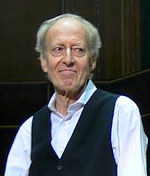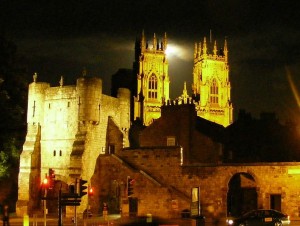The ‘Beyondness of Things’:
Posted by SociusJul 4
The other morning, I was at home, relaxed and at ‘peace with the world’. I was listening to music on CD – music composed by John Barry – to whom the title of this blog must be attributed. It is the title he gave to the album of music, composed and conducted by him, and I was totally absorbed by its beautiful melodies; and, as I say, relaxed and at peace.
 |
John Barry – September 2006 – at the Royal Albert Hall, London
The following quotation, taken from the sleeve notes of the CD, begins to explain – gives us a hint of – what was in the composer’s mind when creating and compiling the CD:
“As a young boy growing up in the North of England, our family would on occasion drive out to an old mill house in the country for lunch. After a meal of the best York ham and eggs, and home-made bread and butter with tea, we would take a stroll through the woods by the river before setting out on the journey home. Driving across the plain of York one would see the magnificent Minster silhouetted against the setting sun. In the years to come, I would commence my serious musical education in composition with Doctor Francis Jackson, the Minster’s Master of Music, in the shadows of this great cathedral.
In the late 70’s, I decided to make my home at Oyster Bay, Long Island, New York. On journeying back and forth to New York City, one is faced with possibly the most spectacular skyline in the world – with its inherent feeling of vitality and excitement, the dynamic hub of the western world.
Both these visions, past and present – ‘The Old Country’ and ‘The New World’ – harbour so many dreams, memories and reflections beyond the norm: The Beyondness of Things.”
(For my son Jonpatrick – John Barry 1998)
Born 1933 in York, John Barry Prendergast, later to be known as simply, John Barry, was educated in the city and received his first lessons in music, as he says, at the hands of Dr. Jackson, one time organist at the Minster. Later, whilst fulfilling his National Service in the armed forces in Cyprus, he began to perform as a musician, having learned to play the trumpet. He first formed his own band, called The John Barry Seven, in 1957. Shortly after this he developed his interest in composing and arranging music; he made his debut for TV in 1958, and from then on, he was consistently composing and arranging music – mostly for TV and the film industry – for the next 50 years and more. He moved to the United States in 1975 and lived there for the remainder of his life, until his death in 2011.
 |
York Minster – Floodlit at Night
As his career developed, he became known world-wide for his ability to assimilate the essence of a film into the film music he composed to accompany and enhance what was being portrayed on screen, and among his most beautiful scores are the themes for films such as ‘Out of Africa’, ‘Dances with Wolves’, ‘Midnight Cowboy’, ‘Born Free’, and his last score for the film ‘Enigma’ in 2001. In addition, he composed a great deal of light music and was perhaps most famously known for his arranging and compositions associated with many of the ‘James Bond’ 007 films. He became the winner of many ‘Grammy’ and ‘Academy’ awards. In 1999, he was given the MBE for his services to music.
But, in all this and not to get too ‘tied up’ with his career, what is most intriguing to me is the title he gave to the music I was hearing – ‘The Beyondness of Things’. I began to ask myself the obvious questions as to what he was meaning; what was the composer getting at; what was running through his mind as he put this music, this album, together? In reply, I can point to only one source for inspiration – the notes he penned to accompany the music – his ‘harbour for ‘so many dreams, memories and reflections beyond the norm’. In the music, one can hear imponderables such as mystery, longing, yearning, peace and, for me, the spiritual essences of life.
All of us live lives in two quite different worlds. In the first, we experience all that is real and tangible. We have our possessions, our homes, our families around us, our jobs, our businesses – food, money and the like. We are well used to all of these. There is nothing puzzling about this life. It is something we see and feel every day of our lives. We know about birth, about death and all that comes between. But, there is another very different life – a life of intangibles, of many things beyond our senses – things we cannot see, things we cannot hear or feel, touch or taste. This life is one lived in the world of many unknowns, a world where there is no proof – no certainty; it is beyond logic and, to all intents and purposes, beyond reason. Yet, this world most definitely exists. It forms an important part of our lives – just as the physical one does. In this ‘other’ world, virtually all of it must be taken on faith, on belief, on imagination and on feelings that are found, perhaps, only in our ‘sixth’ senses, in our very soul ; it is a world full of those delicious intangibles that John Barry refers to in his sleeve note – the dreams, the memories and the reflections beyond the norm. And, it is this world we hear in the music of his album.
I have thought long and hard about this ‘other world’. For me, it is world which belongs not to this ‘hard nosed’ earthly life of ours, but to that ‘other world’ in which the spirit governs. It is a life which has its centre in our innnermost selves, our thoughts, our prayers, our sorrows, our joys, happiness – and its opposite; for me, it is all about the soul which is our ‘true life-blood’. This is the life that yearns for God, for Jesus our Saviour, for the Holy Spirit, the last named person of the holy Trinity being the One who, in my mind, gives us this life of the spirit. In this way, He is teaching us about the ‘other things’ that matter – the things that transcend our ‘hum-drum’ lives in the ‘ordinary’ – and pointing us to the dynamic and, ultimately, magnificent life that God wishes us to know and love, a life in the extra-ordinary. This ‘second’ life is one of beauty and imagination beyond all comparison – if only we allow ourselves to recognise and follow it. It is this we can sometimes hear in music – and see in great works of art – a life that can be truly wonderful to behold.
It is also, by its very nature, a life on earth that holds open for us the door to something much greater than the norm – a life of promise – a life of hope – a life of eternal happiness in heaven, for, come what may, that is our destiny. Out of his infinite love, God designed this destiny for each and every one of us. All He asks is that we do our best to love Him in return.
Socius

One comment
Comment by musical on September 14, 2014 at 12:58 am
I am genuinely delighted to read this blog posts which includes lots
of helpful data, thanks for providing such statistics.